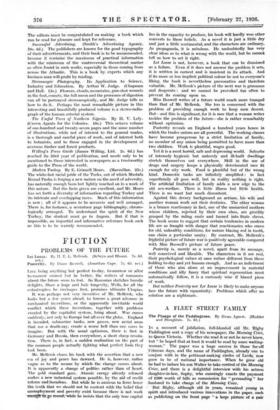FICTION
PROBLEMS OP THE FUTURE
Let Loose. By HI. E. L. Mellersh. (Selwyn and Blount. 7s. 6d.
Lim being anything but perfect to-day, to-morrow or after to-morrow cannot but be better, the writers of romances about-the-future seem to-feel. -So Rousseau sketches bucolic delights,. Shaw a huge and, hale longevity, Wells, for all the catastrophes he envisages first, proinises ultimate Utopias.
It was_ perhaps not very inventive . of Mr. Mellersh, who looks but a few years ahead,. to foresee a great advance in mechanical inventions, or the apparently inevitable world conflict which these inventions, together with problems created by the capitalist system, bring about. War comes suddenly, not only to Europe but all over the globe. England is invaded, submarine tanks, new gasses, new aerial arms that use a death-ray, create a worse hell than one cares to imagine. But with the usual optimism, there is first in Germany and Russia, then everywhere, a short sharp revolu- tion. There is, in fact,' a sudden realization on the part of the common people actually fighting what perfect fools they had been.
Mr. Mellersh closes his book with the assertion that a new era of joy and peace has' daWned. He is, however. rather vague as to- the means by which. the change conies 'about. It is apparently a change of politics rather than of heart. The gold standard goes. Atomic energy already released makes a new industrial system possible, by the aid of credit reform and Socialism. But while he as anxious to force-home the truth that we should not be content with the belief that unemployment and poverty exist because there is not work -ettottglritr go round; while he insists that the only true capital lies in the capacity to produce, his book will hardly woo other converts to these beliefs. As a novel it is just a little dry and just a little sentimental, and the characters are ordinary. As propaganda, it is nebulous. He undoubtedly has very clear ideas as to what is wrong with the world, but he cannot tell us how to set it right.
Let Loose is not, however, a book that can be dismissed as a failure. Even if it does not answer the problem it sets, it is written in earnest and is insistent in its attack. And if its more or less implicit political colour be not to everyone's liking, the book is nevertheless provocative and therefore valuable. Mr. Mellersh's picture of the next war is gruesome and desperate : and we cannot be provoked too often to prevent its coming upon us.
Miss Boswell writes of a future world much more tranquil than that of Mr. Mellersh. She too is concerned with the problem of providing enough work to keep men decent. But—and this is significant, for it is rare that a woman writer tackles the problem of the future—she is rather remarkably without optimism.
Posterity reveals an England a hundred years hence in which the trades unions are all powerful. The working classes have become prosperous by a strict limitation of family, no member of any union being permitted to have more than two children. Work is plentiful, wages good.
Yet it is a most horrid, safe and depressing world. Suburbs of intensely hygienic but unlovely and ill-built dwellings stretch themselves out everywhere. Skill in the use of drugs and surgery keeps a physically deteriorated race fit enough for city work. Food is plentiful but of the wrong kind. Domestic tasks are infinitely simplified : in fact superficially all goes well, but in reality nothing is right. The artificial limitation of family adds a new edge to the old sex-warfare. There is little illness but little health. There is no want but much discontent.
Against this dreary background, an artisan, hii wife and another woman work out their destinies. The other woman is a brazen reactionary in fact, one of the unmarried mothers whose children, rejected".by their own class, are greedily grasped by the ruling caste and turned into State slaves. The book seems to suggest that certain tendencies in modern life are so fraught with danger_ that reactionaries who crave for old, unhealthy conditions, for 'nature blazing red in tooth, can claim a particular sanity. By contrast, Mr. Mellersh's frightful picture of future war is positively agreeable compared with Miss Boswell's picture of future peace.
Posterity is, merely as a novel, apart from- its message, well conceived and likeable. The characters in it are real, their psychological values at once rather different from those holding to-day and yet human enough.. And as an indictment of those who aim alone at an improvement in material conditions and idly fancy that spiritual regeneration must automatically follow, it is a curiously wise if biased piece of work.
But neither Posterity nor Let Loose is lady to 'make anyone face the future with equanimity. Problems which offer no solution are a nightmare.






















































 Previous page
Previous page